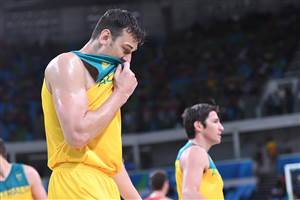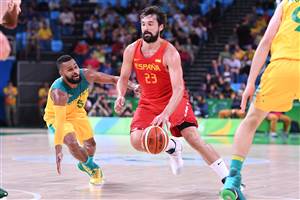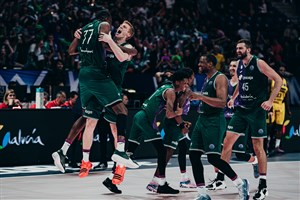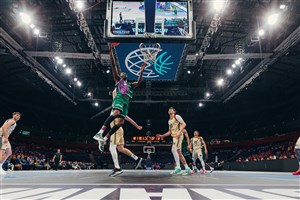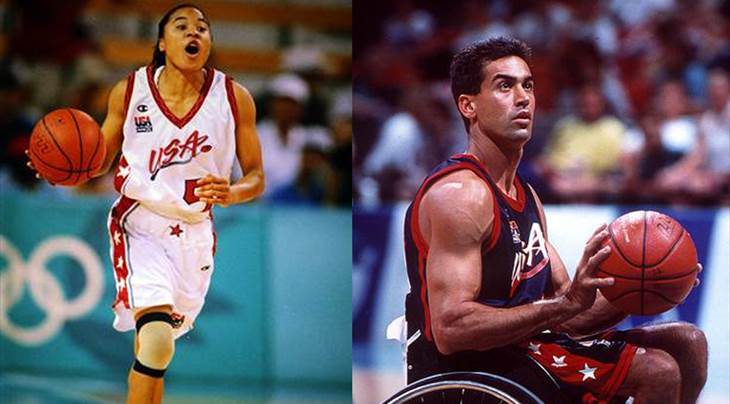
When Trooper met Staley
CHARLOTTE (Steve Goldberg's Wheel World) - In the lead-up to the 1996 Atlanta Olympic and Paralympic Games, the USA Women's Olympic Team was in Atlanta to play an exhibition game at Morehouse College, which would be a basketball venue when the world arrived later that summer.
The game against the WBCA (Women's Basketball Coaches Association) All Stars was scheduled early in the day because the women would be attending the Naismith Awards banquet that night.
As her teammates got their gear together after the game, 25-year-old Dawn Staley, an Olympic rookie, was asked to come back out to the court for a short video shoot with a member of the USA Men's National Wheelchair Basketball Team we had arranged to promote the Paralympics which had little if any awareness in the United States. (It would be the first complete Paralympic Games in the U.S. as the 1984 event was split between New York and England.)
Dawn Staley (top row, 2nd from right) on her first Olympic team at Atlanta 1996. She also played in Athens 2004 and Beijing 2008.
As she walked from the far end of the arena where the locker rooms were, Staley sized up the lean, dark-haired guy rolling around, putting up shot after shot from distance. Atlanta would be the second of four Paralympic teams for Trooper Johnson, then 32, a certified gym rat who had dedicated himself to the game after an accident during his freshman year in college left him paralyzed.
She was about to find out how much.
After a brief introduction, the camera man asked them to just shoot around for a bit. The ball was tossed to Staley who casually dribbled towards Johnson who immediately hand-checked the former two-time player of the year at the University of Virginia.
When I hand-checked her, it was like, let's get going; let’s play this. I remember that look, it was like 'What the heck'. It went from there. – Trooper Johnson
She looked puzzled and a bit annoyed. This was supposed to be something casual. But ever the competitor, Staley gathered herself, coiled at the knees and waist, and started to dribble with purpose. Challenge accepted; game on.
Trooper Johnson shooting against Japan at the Athens 2004 Paralympic Games. Photo by Steve Goldberg/SCS Media
"I'm super competitive," Johnson laughed when I asked him what he was thinking at that moment. "As soon as she got on the court I thought this is a chance to play against her."
He says the that the USA women and the men's wheelchair team often trained at the Olympic Training Center in Colorado at the same time and would cross paths. He says he never spoke with Staley then, remembering her as "one of the quiet ones".
What was supposed to be a friendly shooting session for the camera evolved into an anything but passive game of one on one.
"My competitive juices were flowing," Staley recalled when I asked her about it in a conference call on Friday. "I think I hurt my ankle in that too."
I was hoping she might have forgotten that part.
After Johnson hit a three-pointer, Staley closed her defense and Johnson pushed to drive past her, rolling over her foot by accident in the process. As I watched this, I looked around and prayed that U.S. coach Tara VanDerveer didn't witness her point guard becoming a speed bump.
"That's what I was thinking too," said Johnson. "I hope I didn't take her out."
They kept on playing; the cameraman continued filming; and we kept watching, not paying attention to the time until a USA assistant came in and asked how much longer we would be. I looked over to the cameraman with the international body language of a question mark, to which he replied, "I've been good. I've just kept filming as long as they keep playing."
The USA assistant called out to Staley, "Dawn, we've got to go. Everyone's waiting on the bus. We've got to get back to the hotel and change."
Staley looked up towards the voice, then back at Johnson defending her, and replied in no uncertain terms, "I'm not leaving until I beat this guy."
It's basketball. If there's an opportunity to win, with the competitive person I am, I like my chances in any type of game. - Dawn Staley
That's who she was as a player and who she is as a coach. Johnson is no different. He would've hand-checked a 7-year-old or Mother Teresa if either came at him with a ball.
Dawn Staley coaching the American team at the FIBA Americas Women's U18 Championship 2016. Photo by Garrett W. Ellwood
Already bonded by their competitiveness, the parallels between Staley and Johnson have continued to this day. I say this day specifically because it was just announced this afternoon by USA Basketball that Dawn Staley will succeed Geno Auriemma as the head coach of the USA Women's National Team.
Johnson was named the head coach of the USA Women's National Wheelchair Basketball Team back in January.
Both were on the bench as assistant coaches in Rio and helped steer their teams to gold medals. Both have helmed national junior teams. Both are hall of famers. Johnson was inducted into the NWBA Hall of Fame last year while Staley went into the Naismith Memorial Basketball Hall of Fame in 2013 and the Women’s Basketball Hall of Fame in 2012.
Trooper Johnson on the bench as assistant coach to Stephanie Wheeler at the 2016 Rio Paralympic Games where the USA won the gold medal. Photo by Steve Goldberg/SCS Media
She played three Olympics to his four Paralympics and one area that I know Johnson would like more similarity would be the three gold medals Staley won on the court. Johnson had one briefly in Barcelona before a failed drug test for a non-performance enhancing pain reliever by another player led to the U.S. losing that medal. He would win a bronze medal in Sydney four years later.
Johnson was and is a big fan of his Olympic counterpart.
"She's an amazing athlete and with what she's done with her career, I'm incredibly excited for her to have the opportunity to lead the team going into Tokyo."
So when's the re-match?
Steve Goldberg
FIBA
FIBA's columnists write on a wide range of topics relating to basketball that are of interest to them. The opinions they express are their own and in no way reflect those of FIBA.
FIBA takes no responsibility and gives no guarantees, warranties or representations, implied or otherwise, for the content or accuracy of the content and opinion expressed in the above article.
To help make this column as inclusive as possible, please send any national or international event information, story suggestions, or comments to wheelworldmail@gmail.com.

